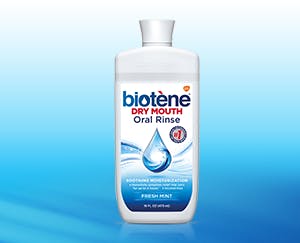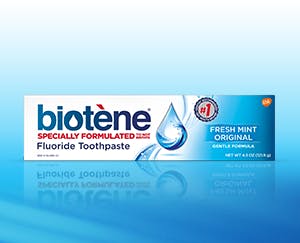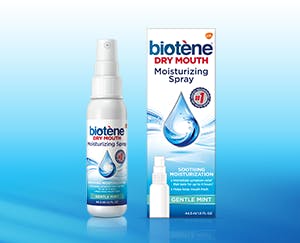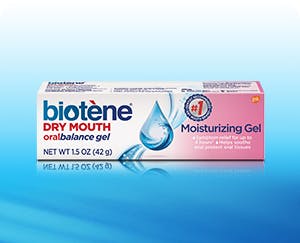Get Answers to Commonly Asked Questions About Biotène
Looking for more information? Contact us at 1-888-521-8033 M-F 8:00am-6:00pm ET so we can give you more personalized attention.
Dry Mouth and Saliva
-
What is Dry Mouth?
Dry mouth can describe both the feeling of dry mouth (xerostomia) and the physical reduction in the flow of saliva (hyposalivation). Dry mouth can be caused by many things, including: medications, disease, radiation illness, aging or even stress. Consistent dry mouth can not only impact quality of life by making it difficult to swallow and speak, and interrupt sleep, but it can also negatively impact oral health. In fact, consistent dry mouth can result in an increase in dental decay, plaque, periodontal disease, gingivitis and other oral irritations. Take note that Biotène is not indicated for these symptoms.
-
What are some symptoms of Dry Mouth?
Symptoms of dry mouth include*:
- A sticky, dry feeling in the mouth
- Problems chewing, swallowing, tasting and speaking*
- Bad breath
- Cracked Lips*
- Dry irritated tongue
- Mouth sores*
- Sleep interruptions due to thirst*
- Gum inflammations*
- Difficulty wearing dentures*
- Dry throat
*Biotène is not indicated for all of these symptoms.
-
What causes Dry Mouth?
There are a number of factors which could cause Dry Mouth. A few of the most common are:
- Side effect of medication – More than 500 medications can cause the salivary gland to product less saliva and therefore lead to dry mouth.
- Multiple medications – The more medications taken, the more likely there is to develop dry mouth2,4,12,13.
- Disease – Some diseases affect the salivary glands. i.e. Sjögren’s Syndrome, HIV/AIDS, Diabetes, and Parkinson’s disease.
- Radiation therapy – The salivary glands can be damaged if exposed to radiation during cancer treatment2,16.
- Chemotherapy – Drugs used to treat cancer can make the saliva thicker, causing the mouth to feel dry2.
- Nerve damage – Injury to the head or neck can damage the nerves that tell the salivary glands to make saliva.
-
Why is saliva so important?
About Biotène Products
-
What makes the Biotène line unique?
-
How do I know which Biotène product to use?
The Biotène range allows consumers to choose the right product or group of products to fit their lifestyle preferences and dry mouth severity. As the severity of dry mouth can vary widely among individuals, a single recommended routine might not suit everybody. Read the product labels, or speak to a healthcare professional to assist you to make your choice about which of our products to use.
-
How do Biotène mouthwash, gel and spray work on dry mouth?
The primary mode of action across this range of oral products is physical (not pharmacological) by helping to retain moisture to help keep the oral tissues feeling moist and by creating a physical coating film to lubricate the oral mucosa, thus helping to relieve dry mouth. Biotène’s moisturizing products are specially formulated to help protect your mouth from drying out.
-
Does using Biotène do more than just drinking water?
The Biotène moisturizing products (Moisturizing Mouthwash, Gel and Spray) contain humectants (substances that help to retain water in the underlying tissues) and lubricants (substances that create a physical coating) to help moisturize and lubricate your mouth. Water does "moisturize", but it is brief due to lack of humectants and once you swallow, the dryness returns. However, we certainly do not discourage you from sipping water to help relieve dry mouth.
-
Do all the products in the Biotène range provide dry mouth symptom relief?
No—the Biotène Toothpaste provides oral hygiene benefits only and does not provide dry mouth relief. With dry mouth, you need extra protection for your mouth and teeth with products that are formulated to be gentle. Biotène’s Fresh Mint Fluoride Toothpaste is specially formulated to be gentle. It contains fluoride to help strengthen your teeth and protect against cavities. The Biotène moisturizing products (Moisturizing Mouthwash, Gel and Spray) all contain moisturizers and lubricants.
About Your Mouth's pH
-
Why is a mouth’s pH level important?
Low pH foods, such as acidic drinks, fruits and other products can be buffered to a certain extent by saliva as saliva increases the pH in the mouth to counter the drop in pH from these foods and drinks.
In dry mouth sufferers, where the salivary flow is already low, this can affect a person’s ability to buffer these acidic properties. Use of oral care products with a pH of less than 5.5 could result in the loss of enamel from the tooth surface, depending on the level of saliva in the mouth. Therefore; for dry mouth sufferers, it is advisable that all oral products have a pH above 5.5 which is closer to normal saliva. This aligns to dental professionals’ preferences for neutral pH products for people with low salivary flow.
Where to Buy
Product Information
-
What are the benefits of Biotène Dry Mouth oralbalance Gel?
-
How much Biotene dry mouth oralbalance gel should you use each time?
Biotène Dry Mouth oralbalance Gel can be used as frequently as needed for dry mouth relief or as directed by a health care practitioner. In accordance with the product label, Haleon CH recommends placing 1-2 cm of gel directly on the tongue and spreading it thoroughly inside the mouth.
*Always follow package directions.
-
What are the benefits of Biotène Dry Mouth Moisturizing Mouth Spray?
-
How many sprays should be made per application?
-
What are the benefits of Biotène Dry Mouth Moisturizing Mouthwash?
-
How does Biotène Dry Mouth Moisturizing Mouthwash help clean the mouth?
-
How long does it take to feel relief and how long does it last for Moisturizing Mouthwash, Gel and Spray?
-
Can I rinse my mouth after brushing my teeth with Biotène toothpaste?
Safety and Regulatory
-
Is there anyone who cannot use Biotène products?
-
Are the Biotène products SLS (sodium lauryl sulfate) free?
-
If propylene glycol is an alcohol, then why does your label say alcohol-free?
‘Alcohol- free’ in labeling pertains to being free of ethyl alcohol (also known as ethanol, or grain alcohol); therefore, we are compliant and allowed to label Biotène as “alcohol- free.” True, propylene glycol is an alcohol; however, it is also a humectant, which is an ingredient that retains moisture (and why it’s used in our dry mouth products).















